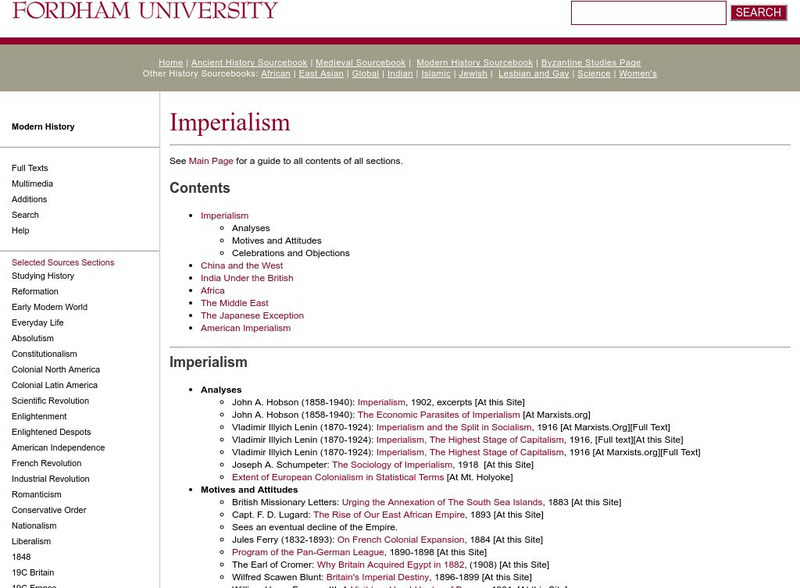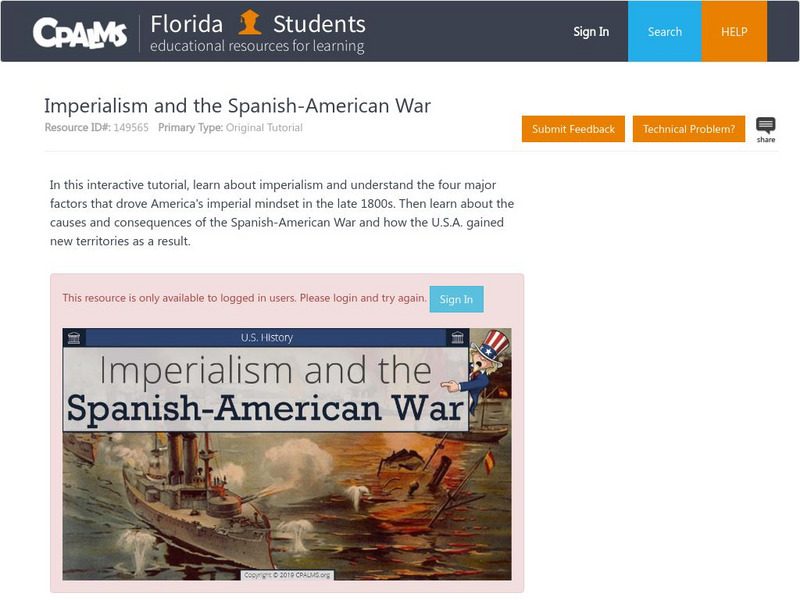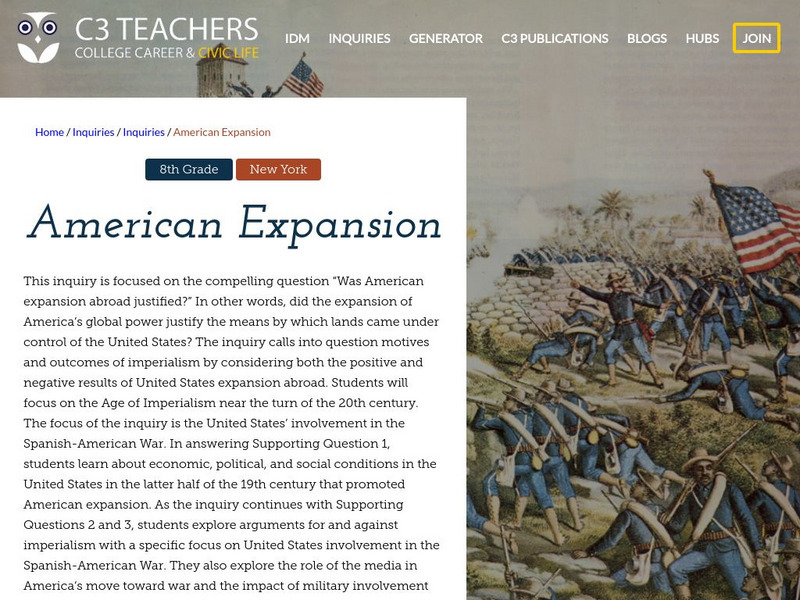Hi, what do you want to do?
PBS
President Theodore Roosevelt: Foreign Policy Statesman or Bully?
Can a negative perception of a president's foreign policy harm his or her historical legacy? A project that winds the clock back to the date of Theodore Roosevelt's death puts students at the editorial desk of a fictional newspaper....
US House of Representatives
Hispanic Americans in Congress During the Age of U.S. Colonialism and Global Expansion, 1898–1945
To be Puerto Rican, in the words of one politician, is to be "foreign in a domestic sense." Young historians consider the American role in colonialism and its impacts on Hispanic Americans through the first part of the twentieth century...
US House of Representatives
Exclusion and Empire, 1898–1941
Often forgotten and written off as the model minority, Americans with heritage in Asia and the Pacific Islands have played an essential role in American history, including Congress. Budding historians reclaim history by researching the...
US House of Representatives
From Exclusion to Inclusion, 1941–1992
The legacy of Japanese American internment impacted America for decades, including Congress. Class members consider the tenure of Asian American representatives in Congress and how the legacy of World War II affected their service. Other...
DocsTeach
Petition Against Annexation of Hawaii
Stop westward expansion! The quick activity delves into the past to understand the petition against the annexation of Hawaii by the United States. Scholars analyze the petition to understand why native Hawaiians were against the...
Teaching Tolerance
Slavery as a Form of Racialized Social Control
An engaging lesson delves into the effects of slavery on society. Young historians read text excerpts, complete handouts, and participate in group discussion to understand how slavery was a means to control society and establish a racial...
College Board
2018 AP® United States History Free-Response Questions
Learners explore the the Age of Imperialism using primary sources and an authentic College Board documents-based question. Other prompts explore the economic changes brought about by the American Civil War, technology, mercantilism, and...
College Board
2017 AP® United States History Free-Response Questions
Were unfair taxes really the cause of the American Revolution? Learners explore the complicated historiography behind the revolutionary period using authentic College Board prompts. The free-response questions from the exam feature...
Annenberg Foundation
America's History in the Making: Classroom Applications Three
How can primary sources bring history to life? Scholars create detailed lesson plans on the late nineteenth and early twentieth centuries in American history. The 17th installment of a 22-part program exploring American history examines...
Annenberg Foundation
A Growing Global Power
How does a nation turn into a global superpower? The 16th installment of the 22-part series on American history investigates the rise of the United States to global importance in the late nineteenth and early twentieth centuries. Groups...
Smithsonian Institution
Eastern Indian Wars
Many know that Native Americans were forced off their lands and moved west, but how did these people react? The Red Sticks faction of the Creek nation opted to defend themselves and their lands in a series of wars called the Eastern...
Maryland Department of Education
The Concept of Diversity in World Literature Lesson 12: Author's Purpose - Yeats and Achebe
Is there such a thing as fate/luck? Can one fight destiny? As part of their study of Chinua Achebe's purpose in writing Things Fall Apart, class members answer these questions from Achebe's point of view and then from William...
Curated OER
Creating a Cartoon of the Philippine-American War
During the Industrial and commercial expansion of the United States, war broke out between America and the Philippines. Explore conflict, American Imperialism, and political cartoons with this creative project. Learners view the film,...
Curated OER
American Imperialism
Critical analysis skills can be built in a variety of ways. Using editorial cartoons (both domestic and foreign) learners will consider how American Imperialism was perceived during the late 19th century. Critical thinking questions,...
Curated OER
American Imperialism
In this American Imperialism worksheet, students respond to 11 short answer questions about the concept and the statehoods of Hawaii and Alaska.
Curated OER
Political Cartoon Interpretation - (1886) American Imperialism
Students analyze political cartoons. In this American Imperialism lesson, students examine "The Cuban Melodrama," and write their own interpretations of the political cartoon.
Curated OER
Playing By Different Rules
Students explore the concept of American imperialism by researching and analyzing historical examples of American imperialism. They draft a set of laws that would govern the actions of powerful nations in other countries.
Library of Congress
Loc: The World of 1898: The Spanish American War
The Library of Congress offers this detailed history of the Spanish American War from historical papers. Includes manuscripts, maps, and illustrations, and an excellent overview essay.
Internet History Sourcebooks Project
Fordham University: Modern History Sourcebook: Imperialism
Collection of primary sources that supports study of imperialism. Sources include contemporary narrative accounts, letters, memoirs, songs, newspaper reports, and a variety of legal, cultural, philosophical, religious, and scientific...
CPALMS
Florida State University Cpalms: Florida Students: Imperialism and the Spanish American War
This tutorial discusses American imperialism and what drove it. The Spanish-American War is examined and the acquisition of new territories by the United States. A PDF file of the tutorial is available.
OpenStax
Open Stax: Foreign Policy 1890 1914: Spanish American War and Overseas Empire
Looks at the development and evolution of the Spanish-American War, at Americans' views on imperialism at the end of this war, and at the relationship of this war with America's other international interests.
OpenStax
Open Stax: American Foreign Policy 1890 1914: Turner, Mahan, and Roots of Empire
Examines the development of American foreign policy in the latter part of the 1800s, and what Frederick Jackson Turner and Alfred Thayer Mahan did to further American imperialistic interests.
C3 Teachers
C3 Teachers: Inquiries: American Expansion
A learning module on American imperialism that includes three supporting questions accompanied by formative tasks and source materials, followed by a summative performance task. Topics covered include the conditions in the late 19th...
Stanford University
Sheg: Document Based History: Reading Like a Historian: American Imperialism
[Free Registration/Login Required] The American Imperialism Unit covers the Spanish-American War and the Philippine-American War. The lessons approach historical inquiry from different angles. One asks students to consider contrasting...




























